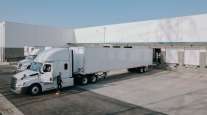Senior Reporter
Container-Shipping Companies Plan Industry Alliance

Five container-shipping companies intend to create a nonprofit association focused on the digitalization and standardization of information used in the industry.
Information technology executives from A.P. Moller-Maersk, CMA CGM, Hapag-Lloyd, MSC and Ocean Network Express are discussing the creation of common information technology standards to be openly available and free of charge for all stakeholders of the wider container-shipping industry.
Shipping companies need to begin operating with a common set of information technology standards, Andre Simha, MSC chief information officer and group spokesman, said in a statement. “We are striving for less red tape and better transparency compared with working in our own closed silos.”
The association has no intention of developing or operating any digital platform but aims to ensure interoperability through standardization. Similarly, the association will not discuss commercial or operational matters, he said.

In our fifth episode of RoadSigns, we ask: How far can we go in terms of automating freight transactions? Hear a snippet above from Ziad Ismail, chief product officer at digital freight matching firm Convoy, and get the full program by going to RoadSigns.TTNews.com.
Having industry standards will allow companies “to concentrate on value-adding differentiation as we move the container-shipping industry towards further digitalization,” Maersk Chief Technology Officer Adam Banks said.
Currently, there are hundreds of types of messages for different ports and terminals worldwide, all with the same basic information, Maria Steffensen, senior management consultant at Deloitte Consulting, told Transport Topics.
“That’s an overhead that is inefficient for everyone,” she said.
Some trends in the market, such as blockchain, cybersecurity and data standards, could be relevant for shipping companies to use in changing the flow of information, Steffensen said.
“CMA CGM is always looking for best practices and standards to support the innovation and digital strategy of the company,” said Rajesh Krishnamurthy, executive vice president of IT and transformations. “Being a founding member will enable us to work together on setting the standards for digitization of the entire industry.”
The group’s plans were welcomed by a U.S.-based group looking to advance standards for blockchain — a shared digital ledger whose secured information accumulates as all parties to a transaction make real-time entries.
“It’s great news. I’m happy to see momentum around the idea of technology standards in supply chains,” said Craig Fuller, co-founder in 2017 of the Blockchain in Trucking Alliance, which since has morphed into Blockchain in Transport Alliance.
“I look forward to seeing how they develop, and ideally the various tech standards groups, including BiTA, will collaborate with each other,” he said.




